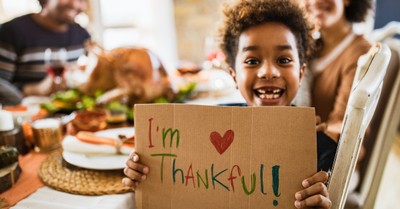How to Get Along with Difficult People (Including Your Family)
- Anne Peterson Crosswalk.com Contributing Writer
- Updated Dec 07, 2018

The holidays are coming, and for some that means family get-togethers. Sitting with those you love who love you back, laughing and telling old stories over and over again.
For others, the mere thought of getting together with certain people is enough to make them cringe.
Not everyone is easy to get along with. And yet, we are expected to try and get along. Read Romans 12:8. God said if possible, and another version said as much as it depends on you.
But before you just use this verse as a reason to NOT get along, let me tell you how to get along with difficult people. I'm not an expert in this field, but like you, I've had my share of altercations.
Photo Credit: Thinkstock

Steer clear of certain topics.
Often like magnets, some people are drawn to talk about the things which seem to cause conflict—areas where you know you have a difference of opinions.
Albert Einstein said, "doing the same thing over and over expecting different results is insanity."
And yet, we seem to do it, don't we?
So if we know that it's not going to yield anything good, it’s better to avoid it.
In their book Boundaries, Townsend and Cloud talk about a person who would walk down the road and get to this large hole and fall in. Day after day, he would do the same thing. Every day falling into the same nasty hole. Then one day, instead of walking by the hole, he walked on the other side of the street.
Sometimes avoidance is the best option. But we don't have to avoid the person altogether—just steer clear of those hot topics.
Photo credit: ©Thinkstock

Let the person talk.
We live in a day and age where there are loads of ways to communicate, but that doesn't mean we are getting better at it. Sometimes, becoming more efficient in digital communication means we are doing less face-to-face, or voice-to-voice. At least with those two routes you have the advantage of letting someone see your expressions, or hear your tones. Without using capitals or emojis, our listener is forever trying to decipher what we mean.
And we make the mistake of thinking that if we say it, it is understood. Remember the children's game telephone? No matter how well you think you are saying something, you are not communicating until the receiver gets the message you said—not a poor version of it.
If you let the person talk, or ask questions as they are talking to you, they will feel heard. Many hurt feelings arise because a person feels unheard.
Photo credit: ©Thinkstock/David Sacks

Watch your body language.
I learned this when I was taking a communications class years ago. If you want to speak and convey you are on the same level as someone, be at the same level physically. If you are standing and they are sitting, they will feel that you are talking down to them. Pun intended.
It’s not just the words we say, but how we say it that matters. Crossed arms reflect a stance of being closed. Try relaxing when you are speaking to a difficult person.
Photo credit: ©Thinkstock

Tones Matter.
Read Proverbs 15:1. I have seen this verse illustrated.
A friend of mine called to see if she and her kids could come and stay with us for a week. I did something I knew I would later regret—I didn't check with my husband but answered right away, "Sure, we'd love to have you."
And I did this because I knew he loved my friend.
When my husband heard about it, his first response was, "Well, you'll have to call her up and tell her she can't come."
Experience had taught me that it would do no good to argue at that point. But then things got harder when he said to me, "So are you gonna give me that back rub you promised?"
Trust me, I wanted to do ANYTHING but rub his back at that point. Still, I decided to follow through on what I said. And here's the hard part, with NO attitude. I gave him a back rub and I actually thought I heard something break inside of me. But I knew I was doing what God wanted me to do.
When I was done, I slipped downstairs to throw a load in the laundry. I didn't hear my husband."Now," he said softly. "Why don't you tell me about that phone call?"
And guess what? He was fine with them coming. And we had a wonderful time.
Photo credit: ©Thinkstock

Extend grace.
I know this person is not easy to get along with. Something makes them difficult, but no matter who they are, we can extend grace. It’s what God instructs us to do.
The verse that cements this in my mind is Romans 5:8. While we were yet sinners, God showed us his love. What? Sometimes I think we forget that and we believe he showed us love because we chose him. Remember that God so loved the world, as it says in John 3:16. And God knew some of the world would not accept him.
Grace is unmerited favor. God is gracious to us just because he chooses to be. We can extend grace in the same way. And if we remember that, it will be helpful. We have a tendency to say, “Did you see how they treated me?”
I’m not diminishing what they did or said to make them difficult, I’m just saying God can enable you to give grace when you’d like to give them what you think they deserve, which looks very different than grace.
Photo credit: ©Thinkstock

Be forgiving.
Years ago I heard Joyce Meyer talk about those who hurt others. It rang true with me because I knew there were times I had lashed out at the people I love. It wasn’t about them, and I felt awful later. But I still had done it.
Maybe, just maybe, the difficult person in your life was hurt. Something made him/her act gruffly, or angrily. I’m thinking of someone right now in my life who is no longer here. I loved my brother, Gus, so much and yet, for reasons unknown to me, he would lash out or simply remove himself from my life for long periods of time. Then one day I got a call. But every time he opened his life back up to me, I was there. Why? I loved him. He was family.
One day after not hearing from him for a while, he called and said, “Anne, I have cancer.”
And I had a decision to make. Would I let his past behavior dictate how I would treat him? I knew what God wanted me to do, so I opened back up. We all did and we were there for him all the way till his end. Why? It’s called forgiveness. Read Ephesians 4:32. Forgiveness is not something we decide based on someone’s behavior—It’s something God expects us to do. Just like he did for me; I didn’t deserve it either.
Yes, the holidays are upon us. It’s time when families get together. Some are excited about it, and some are not. Why not use this holiday season as a reason to love like you’ve been loved?
It’s never too late to do the right thing.
Father God, I come before you and ask you to help those who will be getting together with loved ones. Lord, you know sometimes we have differences and those differences can divide us. And if left that way those wedges deepen over time. God, you are the God of reconciliation. Will you help us to love like you love? Will you help us to be kind, and tenderhearted and forgiving? Lord, we can’t do it without you. It’s impossible. But you said the things that are impossible with man ARE possible with you. So we ask this in Jesus’ precious and Holy name. Amen.
Anne Peterson is a poet, a speaker, and an author of 14 books. Anne understands abuse as she has written a memoir, Broken: A story of abuse and survival. You can see more of Anne’s work by checking out these links. And although Anne has many titles, her favorite is still ‘Grandma’ to 4 grandchildren here and one in heaven. Download a free copy of her book Real Love by joining her email list. Sign up for anne’s newsletter and receive her free eBook, Helping Someone in Grief: 17 Things You Need to Know. Visit her website at www.annepeterson.com. You can find her on Facebook, Twitter, and Google.
Photo credit: ©Thinkstock/smphoto


















